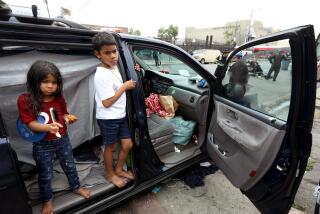Crippled of Mexico Aided in Hawthorne
Sandra Leticia Robles, an unemployed teen-age mother from Tijuana, chewed on the end of a pencil as she stood in a room at Hawthorne Hospital, waiting to hear news about her 17-month-old daughter, Melinda.
The toddler, who was born with a clubfoot, was the first child to undergo corrective surgery Monday morning under a new program that brings poor people from Mexico to Hawthorne for treatment of crippling foot disorders.
The cost of the surgery, transportation from Mexico and other medical expenses were donated through a joint effort of the hospital and the Baja Project for Crippled Children, a nonprofit program formed by Southern California doctors.
Robles, 18, was smiling and chatting with another woman Monday morning when hospital officials told her that the surgery was a success: Her daughter should be walking normally within six months.
“Oh, I was so nervous, my heart was just pumping,” she said in Spanish. “I nearly chewed this pencil in half.”
Hawthorne Hospital and the Baja Project brought Melinda Robles, two other toddlers with clubfeet and an adult--all from either Mexicali or Tijuana--to undergo corrective foot surgery. Surgery for the two other toddlers, however, was delayed because doctors determined that they were anemic and too weak to undergo operations, said Carl Wagreich, director of the hospital’s podiatric residency program. One child also had an upper respiratory infection, he said.
The adult, Enrique Macias Ornelas, 36, had surgery Monday afternoon to repair a heel bone that he fractured when he fell from a ladder two years ago, Wagreich said.
Wednesday, the hospital transported the children, their parents and Ornelas back to Mexico. The toddlers with anemia were referred to doctors in Mexico and will be rescheduled for surgery, Wagreich said.
The cooperative effort between the hospital and the Baja Project dates to 1976, when podiatrists from Hawthorne Hospital and other hospitals throughout Southern California began weekly visits to La Casa de Pobres in Tijuana and the Orthopedic Clinic del Valle in Mexicali, Wagreich said.
The Baja Project has about 30 volunteer podiatrists and podiatry residents and treats about 500 patients each year, he said. The patients are usually children with clubfeet, polio or cerebral palsy, Wagreich said.
Because of the difficulty of transporting surgical equipment to Mexico, representatives of the hospital and the Baja Project decided to bring patients to Hawthorne, he said.
Wagreich said he hopes the hospital and the Baja Project can continue to perform free surgery at least once a month. He said members of the Baja Project will continue to provide free medical care at the clinics in Mexico.
“It’s what medicine is all about: making a difference,” he said.
Alejandrina Almendra, the mother of one of the anemic toddlers who could not have surgery, said: “I assure you that I will do everything to make sure he gets treated.”
Robles and Almendra said they learned of the Baja Project from people at La Casa de Pobres. They added that without the program they could not afford the surgery.
Almendra said: “We don’t have anything, but thank God things have gone very well.”
More to Read
Sign up for Essential California
The most important California stories and recommendations in your inbox every morning.
You may occasionally receive promotional content from the Los Angeles Times.











